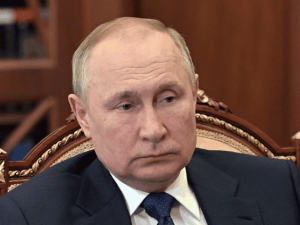
by Theodore Dalrymple
When I watched Vladimir Putin, with what the Russians so graphically call his “tin eyes,” justify his invasion of Ukraine, I thought, as did many others, that he looked a little deranged. Denazification, indeed! Had he failed to appreciate that Ukraine, not noted throughout its history for its philo-Semitism, had elected a Jewish president, and that by a large majority, thereby suggesting a major cultural shift in the country?
It then occurred to me that Putin looked rather puffy in the face, and I wondered whether he could be taking steroids. These drugs are noted for their numerous side effects, not the least being psychological changes such as paranoia and elevation and depression of mood. Then there was the question, of course, as to why Putin would be taking them. Cancer, perhaps—a lymphoma? This brought to mind Evelyn Waugh’s somewhat uncharitable remark when Randolph Churchill underwent surgery for cancer: that it was characteristic of modern medicine to have removed the only part of him that was not malignant.
If Putin were taking steroids, his extreme and seemingly bizarre anxiety about contracting Covid-19 would be explained. Both the underlying condition of cancer itself and the drugs would have made him vulnerable to such anxiety, and the man who once liked to present himself as the Russian Crocodile Dundee, bare-chestedly wrestling bears and the like, has undergone a gestalt switch: invulnerability has been replaced by its opposite, unseen danger with every breath.
It is hazardous, however, to ascribe actions that we do not like to madness. This is for two reasons: first, the diagnosis may be wrong—the apparently mad may in fact be sane—and second, madness can have its own rationality. Indeed, the mad of strong character can often take others along with them: they can persuade others that their paranoid view of the world is correct. This is especially so when they possess levers of power over people of lesser character than themselves.
People can be mad and realistic at the same time. Their paranoia has a self-fulfilling quality: if you behave as if people were against you, people will soon begin to behave as if they were against you. The origins of the problem become lost in a vicious circle of historical recrimination. But, given a paranoid premise, the mad can proceed rationally. If you think your food is being poisoned, it is perfectly sensible to try it out first on the cat.
The power of the paranoid over their followers is, however, fragile, as is that of those who rule principally by fear. Separated for a time from contact with the worldview of their leader, or if the hold of fear is suddenly broken, the power collapses. The madness of the madman is suddenly revealed; the fearful suddenly realize that it takes two to be ruled by fear. The mad or fear-instilling megalomaniac then lashes out—for he knows that, like the late Nicolae Ceaușescu, he is either powerful or dead.
In Ionesco’s great play, The King Departs, the ruler of his crumbling kingdom, the absurdly named Bérenger, learns that he is soon to die (as he never thought until then that he ever would), and he makes a speech in which he demands that after his death all history books should be about him, all statues should represent him, all public institutions should be named after him. It is his revenge on mortality, as perhaps is Putin’s threat of nuclear war.
I should, perhaps, declare an interest: I am taking steroids myself. Perhaps this is clouding my judgment.
First published in City Journal.
- Like
- Digg
- Del
- Tumblr
- VKontakte
- Buffer
- Love This
- Odnoklassniki
- Meneame
- Blogger
- Amazon
- Yahoo Mail
- Gmail
- AOL
- Newsvine
- HackerNews
- Evernote
- MySpace
- Mail.ru
- Viadeo
- Line
- Comments
- Yummly
- SMS
- Viber
- Telegram
- Subscribe
- Skype
- Facebook Messenger
- Kakao
- LiveJournal
- Yammer
- Edgar
- Fintel
- Mix
- Instapaper
- Copy Link







One Response